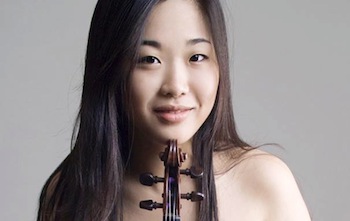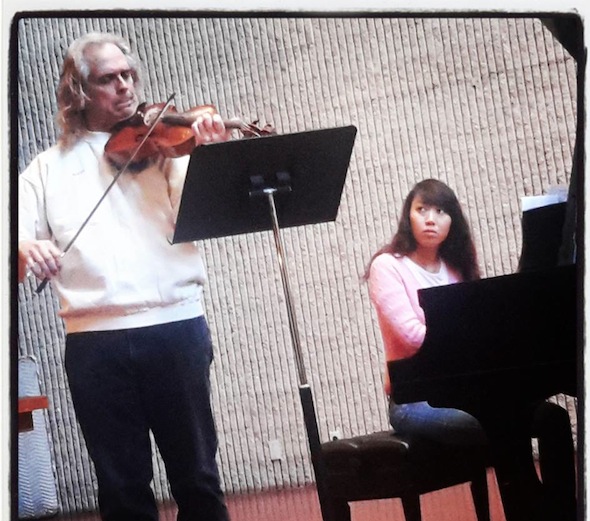Concert Review: Chameleon Arts Ensemble Sparkles, As Usual
Chameleon Arts Ensemble’s rather lengthy program was like a huge feast, ending with the sumptuous Saint-Saëns’ Sonata No. 1 in d minor.
By Susan Miron
I’ve been to about ten Chameleon Arts Ensemble concerts, and every time I hear them I say that, were I a civilian rather than a reviewer, I would definitely get a subscription. This is a chamber music group, now in its sixteenth season, that has unusually imaginative programming, terrific players, and superb performances, whether the music is three hundred years old or brand-new.
CAE was operating on all cylinders on Sunday afternoon at Goethe Institute, one of their two steady venues (the other is at First Church in Boston on Marlboro St. on Saturday nights). The program, entitled “melodies, at distance heard,” featured two works by living composers: Piano Trio by Philippe Hersant (born 1948) and “Ockeghem Variations” by Judith Shatin (born 1949). Surrounding these pieces were lesser-well known works by well-known “classical” composers, Beethoven, Britten, and Saint-Saëns. All five works involved some form of variations.
The concert began with a perfect concert opener, “Twelve Variations in G Major on See the conqu’ring hero comes from Handel’s Judas Maccabaeus. The superb cellist Rafael Popper-Keizer and pianist Vivian Choi delivered an elegant account. Beethoven, Gabriel Langfur’s always-informative program notes point out, was quoted as saying “Handel is the greatest composer who ever lived. I would uncover my head and kneel down at his tomb.” Short of doing that, The Twelve Variations were a lovely homage, and part of a cache of cello and piano works (the others were the first two Cello Sonatas, Op. 5) that are really duos rather than cello with piano accompaniment.
Ms. Choi then played the spooky piano part to Benjamin Britten’s Lachrymae: Reflections on a Song by John Dowland. Lachymae came about after Britten met the American violist William Primrose in 1949, and was written for the two men to play at the 1950 Aldeburgh (England) Festival. The piece was clearly dear to Britten’s heart because he did another version for viola and string orchestra. In 1984, I arranged the piano part for harp, and this has become another, albeit less popular, version. I had only heard the piece with piano once, and was amazed how different the colors and moods were on the piano, which, although it was Britten’s original take on this piece, took a bit of getting used to. Two of Dowland’s famous songs are quoted, “Flow my Tears” and “If my complaints could passion move,” the latter turning up, played by the viola, at the end of the piece. It is quite a surprise, given that the tune had been deconstructed in the previous variations. Scott Alan Woolweaver and Vivian Choi delivered a beautiful, moving performance.
Philippe Hersant’s Piano Trio is subtitled Variations sur la ‘Sonnerie de Sainte-Geneviève-du-Mont’ de Marin Marais. The French composer characterizes himself “as a tonal composer willing to turn music’s entire heritage – from Monteverdi to Janacek to Stockhausen – to his advantage. As a composer, “he lives by a few precepts: to be personal rather than to seek innovation at all costs, to avoid grayness, and to surprise.” Hersant sees this Trio as “a continuation, an amplification on the baroque composer’s piece.” Premiered in 1998, the trio is full of scintillating textures. It was played with great verve by violinist Kristin Lee, cellist Rafael Popper-Keizer, and pianist Elizabeth Schumann.
After the intermission, Ockeghem Variations received yet another excellent performance by pianist Vivian Choi and a woodwind quintet made up of Chameleon regulars – flutist and the group’s inspired artistic director Deborah Boldin; oboist Nancy Dimock; clarinetist Gary Gorczyca; bassoonist Margaret Phillips; and French hornist Whitacre Hill. The ensemble playing was both rock solid and quite beautiful. The variations – Lustrous, Ringing, Electric, Floating, and Resounding – were full of charm, jazzy exuberance, and moodiness. Almost everyone got some solos, but the flute received the most memorable of the lot, and they were played with great tonal beauty. My only complaint is my usual gripe about about the Goethe Institute performing space – the sight lines are terrible. If you aren’t in the first few rows, it is nearly impossible to see the players. This is, thankfully, not a problem at First Church.
The rather lengthy program was like a huge feast, ending with the sumptuous Saint-Saëns’ Sonata No. 1 in d minor. What an exhilarating performance it received! Violinist Kristin Lee and Elizabeth Schumann should absolutely record this because I doubt it could be played better. It reminded me a lot of his violin writing in his Fantasy for Violin and Harp. I had never heard Lee before, and I was left extremely impressed.
Chameleon’s next concerts will be on Saturday, March 22 and Sunday, March 23. The theme is “a song of passing years,” and will include Brahms’ Sonata No, in f minor for clarinet and piano; Charles Ives’ Sunrise for voice, violin and piano; Harrison Birtwistle’s An Interrupted Endless Melody for oboe and piano, Enescu’s Piano Quartet No. 2 in d minor, and Ravel’s beautiful Chansons Madecasses for voice, flute, cello and piano.
Susan Miron, a harpist, has been a book reviewer for over 20 years for a large variety of literary publications and newspapers. Her fields of expertise were East and Central European, Irish, and Israeli literature. Susan covers classical music for The Arts Fuse and The Boston Musical Intelligencer. She is part of the Celtic harp and storytelling duo A Bard’s Feast with renowned storyteller Norah Dooley and plays the Celtic harp at the Cancer Center at Newton Wellesley Hospital.



Thank you for this coverage. We very much appreciate it.